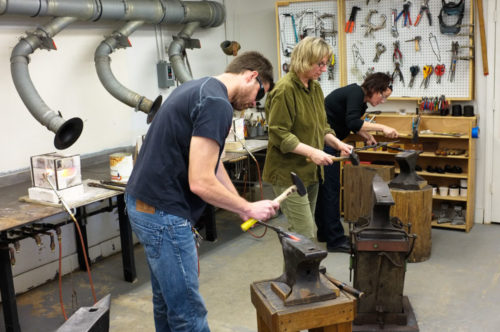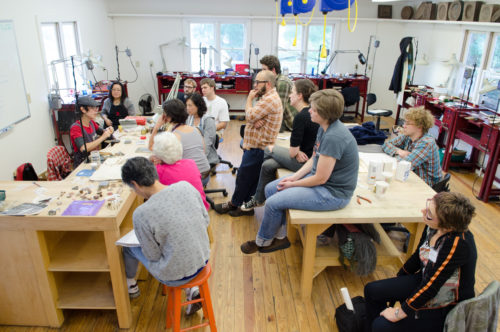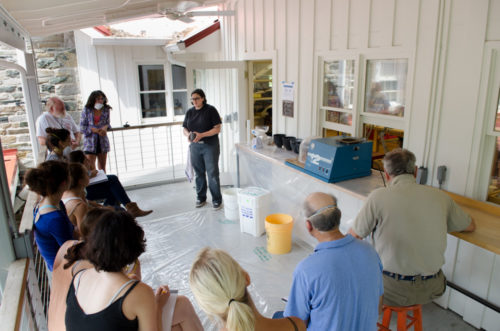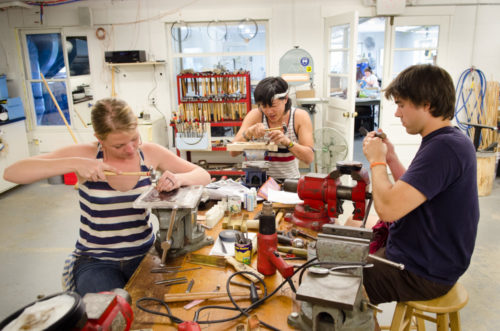Penland Metals Program


The Penland metals program offers beginning to advanced workshops in traditional and contemporary metalsmithing. Two studios provide space and specialty equipment for the exploration of concept and technique in metals. The scope of each workshop is determined by the instructor with input from our program director and support from our programming staff. Our versatile facility and high caliber artist/educators allow us to provide relevant programming in topics from jewelry design and metal fabrication to mixed media sculpture and everything in between. We strive for a balance of technical and aesthetic content and value all cultural and historical perspectives. We offer workshops that inspire and challenge students from curious beginners to accomplished professionals. Our programming is current in spirit and respectful of craft traditions.
The studios are very flexible, but are particularly well equipped for fabrication, casting, enameling, hollowware, etching, and finishing for jewelry and small objects. The range of workshop topics includes but is not limited to jewelry design and fabrication, stonesetting, cold connections, small sculpture, working with found objects and alternative materials, production design and marketing, patination and color, kinetics, electroforming, toolmaking, raising and forming, chasing and repoussé, and engraving. Materials and techniques are combined in a myriad of ways, and instructors often ground technical exploration with conversations about historic and/or current context, design, or idea generation. Recent instructors include Myra Mimlitsch-Gray, Sondra Sherman, Hiroko Yamada, Bob Ebendorf, Lola Brooks, Michael Good, Elizabeth Turrell, Suzanne Pugh, Lynn Batchelder, Mary Hallam Pearse, Simon Cottrell, Attai Chen, Cappy Counard, Melanie Bilenker, Demitra Thomloudis, Kirk Lang, and Lauren Kalman, among many others.
Our workshops take place in two well-equipped, well-maintained, and safe metals studios designed to accommodate diverse content and working styles. There are benches for each student, well-ventilated soldering stations, an acid room, a tool room with work space, and covered outdoor work and meeting spaces.


Classroom
The two metals studios are housed in the Edward Fortner Metals Studio in between the Main Office and the Clay Studios. The studios are named Upper and Lower Metals, and both are accessible from outside as well as being connected by an inside staircase on the south wall with a stair lift. The classrooms are slightly different, but both have a bench room/classroom that is adjacent to an equipment room where noisy, heavy, or hot work is done. At most there will be twelve students in your class. Each studio also has a stereo and a refrigerator for your convenience.
Student Workspace and Storage
Each student gets his or her own bench at which to work. Each bench has an incandescent lamp, flex shaft, bench pin, chair, and lockable storage. The storage space is approximately 1 cubic foot and requires a small padlock. Students should bring their own lock or one can be rented or purchased from the school store (quantities are limited).
Equipment: Upper Metals
Bench Room:
13 jeweler’s benches, each equipped with:
-Foredom flexshaft
-GRS mounted bench pin
-Swing arm lamp
Soldering:
4 stations equipped with:
-Smith acetylene/air torches
-Smith mini propane/oxygen torches
-Rotating annealing pans with pumice and soldering brick
-Torch strikers
Soldering tripods with steel screens
Assorted tools including picks, standard and cross locking tweezers, and third hands
Pickle pots
Enameling:
3 standard sized Vcella enameling kilns
Large scale Vcella enameling kiln
Assorted firing forks, trivets, and firing racks
Casting:
Paragon wax burnout kiln
Nuetec vacuum casting machine
2 tabletop vacuum investing and casting machines
Centrifugal caster
Oxy/propane Swiss torch
Vulcanizer
Wax injector
Assorted wax tools
Step shear
Portaband saw
2 Drill presses
Durston 150mm wire & flat rolling mill
6″ flat rolling mill
Draw bench
Small slip roller
Hydraulic press
3 anvils
3 vises
Compressed air hose
Tumbler with assorted media
Metals library
Assorted hand tools:
Chasing tools
Dapping punches & block
Disc cutters
Files
Hammers and mallets
Layout/measure & marking tools
Polishing room:
Buffing machines
Grinder
2 belt sanders
Sandblaster
Equipment: Lower Metals
Bench Room:
13 benches, each equipped with:
-Foredom flexshaft
-GRS mounted bench pin
-Swing arm lamp
Soldering:
4 stations equipped with:
-Smith acetylene/air torches
-Smith mini propane/oxygen torches
-Rotating annealing pans with pumice and soldering brick
-Torch strikers
Soldering tripods with steel screens
Assorted tools including picks, standard and cross locking tweezers, and third hands
Pickle pots
Raising/forming stakes
Stumps for sinking
Sand bags for sinking/forming
6 vises
2 anvils
6″ hydraulic deep draw press & tooling
Power Durston 150mm rolling mill
80mm flat/groved rolling mill
Lathe & tooling
Knee mill & tooling
Large band saw
2 drill presses
Powder coating setup
Bending brake
Beverly shear
Tumbler with stainless steel shot
Assorted hand tools:
Chasing tools
Dapping punches & block
Disc cutters
Files
Hammers and mallets
Layout/measure & marking tools
Acid Room:
Vented acid etching booth
2 Electroplating/forming baths
Assorted Rectifiers
In storage we also have: 16 assorted sized pitch bowls, a mini forge, hot plates, Sparkie fusion welder, alcohol lamps, wolf wax working tools, wax double boiler, 4″ belt sander, 2 large propane annealing torches, cordless drill, an angle grinder, and assorted enameling supplies.
This list of equipment is not comprehensive; it is meant to give you an idea of what to expect during your class at Penland. Keep in mind that, although we have the equipment, it may not be necessary for your class, and it may not be prepared for use. The equipment used by your class will be determined by your instructor and will be appropriate to the techniques covered in your class.
Shared Studio Equipment
Shared air space/music: each class should discuss the playing of music and reach a consensus on the time of day, the volume, and the type of music to be played. Tolerance and consideration are expected from everyone.
The equipment in the metals studios is shared equipment. If there is equipment you need to use in the other metals studio, you are more than welcome to use it as long as you are not interrupting a demo or someone else’s work on that equipment. You are also welcome to relocate smaller tools to suit your needs, as long as you return the tool to its place of origin when you are finished using it.
If during your session you wish to use equipment in any of the other studios at Penland, you must work with the instructor, studio assistant, or coordinator of that studio to arrange access. They will determine if the use is compatible with their class’s activities and if you are able to work safely and independently with the equipment.
Toolkits
Beginner toolkits are available for check out. These kits include: saw frame, ring clamp, pliers, center punch, bench block, and a small rivet hammer. There is a small rental charge, and students are responsible for replacing lost or damaged tools.
Supplies and Materials
Some general materials and supplies are kept in stock at the Penland School Store. In the metals section you will find the following (i.e., enamels and tool steel):
|
Classroom
The two metals studios are housed in the Edward Fortner Metals Studio in between the Main Office and the Clay Studios. The studios are named Upper and Lower Metals, and both are accessible from outside as well as being connected by an inside staircase on the south wall. The classrooms are slightly different, but both have a bench room/classroom that is adjacent to an equipment room where noisy, heavy, or hot work is done. At most there will be twelve students in your class. Each studio also has a stereo and a refrigerator for your convenience.
Student Workspace and Storage
Each student gets his or her own bench at which to work. Each bench has an incandescent lamp, flex shaft, bench pin, chair, and lockable storage. The storage space is approximately 1 cubic foot and requires a small padlock. Students should bring their own lock or one can be rented or purchased from the school store (quantities are limited).
Unless the instructor has asked for a specific material and/or size, or you foresee needing something other than what is listed above, then you should bring your own material.
The School Store also carries small expendable tools such as: saw blades, sandpaper, drill bits, assorted rotary tool bits, and some small hand tools. It is best to bring your own favorite hand tools and rotary tool bits for use at the bench. The store accepts cash, check, Visa, MasterCard, and Penland Tender.
*Instructors: quantities are limited at the School Store, so please notify the coordinator if specific materials and/or sizes will be primarily used.
As a class uses supplies, gases, expendable materials, and special materials requested by the instructor; a studio fee will be assessed.
Safety Information
Your instructor will list any specific safety equipment required in his or her list of materials. In addition to what your instructor lists, you should bring safety goggles, a particle mask or respirator, hearing protection, gloves, an apron, and a shop towel for drying your work. These items are also available for purchase at the School Store if you wish to purchase them when you arrive.
There is a mandatory studio/safety tour at the beginning of every class. The tour or walk-through is an introduction to the studio space and the safety equipment. Each studio has three fire extinguishers, a first aid kit, and an eyewash station. The lower studio has a safety shower by the large annealing torch and a safety shower and eyewash station in the etching room. Penland has a hazardous waste removal program, so all studio waste is properly disposed of. If your class generates any hazardous waste, you will be charged a small fee to pay for its removal.
Alcohol is not permitted in the studio. Working while intoxicated is prohibited. No illegal drugs are allowed on campus.
Session Schedule
Each session starts with an all-school meeting Sunday evening at 5pm followed by dinner in the Pines. Classes start Sunday at 8:30pm. Classes end and studio clean-up takes place the day before your session ends. The last day of each session is reserved for farewells and an all-school exhibition of work created during your time at Penland.
Everyone must participate in studio clean-up; if you must leave early, please ask the studio assistant to assign you clean-up tasks you can accomplish before your departure.
If you have questions, contact:
Studio Coordinator: Nadia Massoud
828-765-2359 x 1320
metals@penland.org


